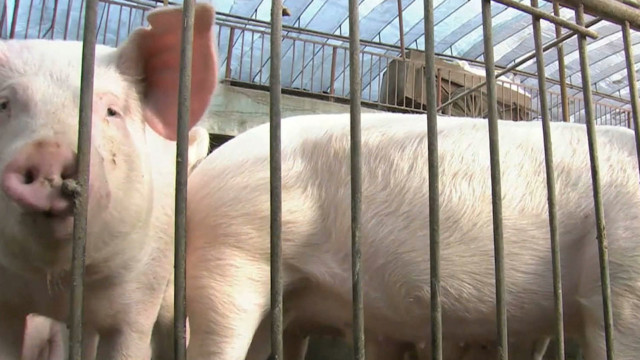In China, officials are taking a close look at farming. They’re trying to make the sector more sustainable.
One way to do that is to find ways to use *everything* generated on farms. As CGTN’s Guan Yang reports, that includes some new uses for manure.
Anyone who’s ever gone near a hog farm will tell you, the smell is terrible. It comes from hog manure, which is stored in underground pits. When Spring comes, the hog manure will be sprayed on farm land as fertilizer without any processing treatment. Now, the hog farm in northeast China’s Liaoning Province is taking a different approach.
“We are making good use of waste,” said Zhang Xichun, the manager of the Zhenxing Hog Farm. “The faeces runs through this drainage ditch, and we then collect it and use it as organic fertilizer, which significantly contributes to the fertility of the soil.”
Livestock waste is a major source of noxious gases and harmful pathogens. Over the years, the country’s policymakers have vowed to increase crop yield and sustainability by turning animal waste into biogas and organic fertilizers – a good way for farmers to generate more income.
China’s livestock produce about 3.8 billion tons of manure each year, more or less the amount of coal than nation consumed. But nearly 40 percent of this waste stays untreated and poses a long-lasting challenge to the environment.
Wang Dongning raises chickens, and recently recently invested in a livestock waste collecting system. He believes it’s money well spent.
“The system is costly, but if the water can be treated immediately, the chance of the chickens getting sick is lower, so in the long run, our profit margins increase,” said chicken farmer Dongning Wang.
During this year’s central rural work conference, officials will discuss issues such as modernization, and the competitiveness of farm products. For ordinary people, food safety is one of the top concerns. The concern now is making sure more of the country’s farm waste is treated properly, and farmers are facing some problems in doing that.
“Livestock farms have to reach a certain size in order to make the utilization of waste feasible,” said Zhang Xichun. “The problems exist in those smaller farms that do not have the funds to realize the method, or the amount of waste is not worth spending money on.”
Livestock waste can be recycled by many modern ways, and for the world’s most populous nation, tackling pollution in rural areas, especially pollution from agricultural sources, will be a top priority in the coming years.
 CGTN America
CGTN America
